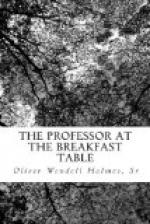—Such was the Book of the Maiden Sisters. You will believe me more readily now when I tell you that I found the soul of Iris in the one that lay open before me. Sometimes it was a poem that held it, sometimes a drawing, angel, arabesque, caricature, or a mere hieroglyphic symbol of which I could make nothing. A rag of cloud on one page, as I remember, with a streak of red zigzagging out of it across the paper as naturally as a crack runs through a China bowl. On the next page a dead bird,—some little favorite, I suppose; for it was worked out with a special love, and I saw on the leaf that sign with which once or twice in my life I have had a letter sealed,—a round spot where the paper is slightly corrugated, and, if there is writing there, the letters are somewhat faint and blurred. Most of the pages were surrounded with emblematic traceries. It was strange to me at first to see how often she introduced those homelier wild-flowers which we call weeds,—for it seemed there was none of them too humble for her to love, and none too little cared for by Nature to be without its beauty for her artist eye and pencil. By the side of the garden-flowers,—of Spring’s curled darlings, the hyacinths, of rosebuds, dear to sketching maidens, of flower-de-luces and morning-glories, nay, oftener than these, and more tenderly caressed by the colored brush that rendered them,—were those common growths which fling themselves to be crushed under our feet and our wheels, making themselves so cheap in this perpetual martyrdom that we forget each of them is a ray of the Divine beauty.
Yellow japanned buttercups and star-disked dandelions,—just as we see them lying in the grass, like sparks that have leaped from the kindling sun of summer; the profuse daisy-like flower which whitens the fields, to the great disgust of liberal shepherds, yet seems fair to loving eyes, with its button-like mound of gold set round with milk-white rays; the tall-stemmed succory, setting its pale blue flowers aflame, one after another, sparingly, as the lights are kindled in the candelabra of decaying palaces where the heirs of dethroned monarchs




